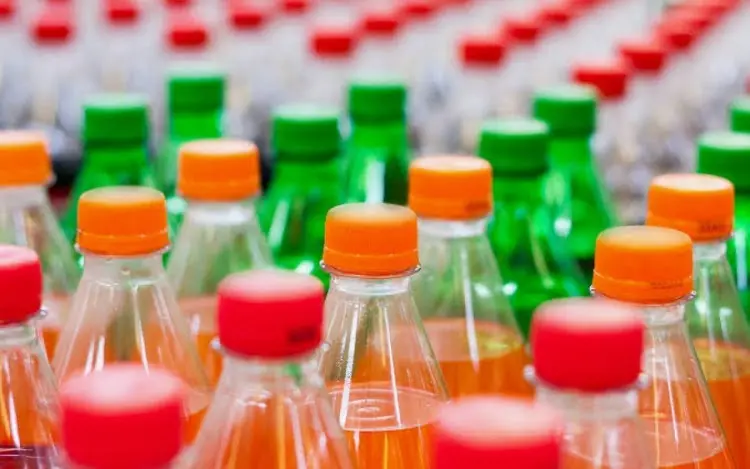While robotic surgery is advancing rapidly, experts warn that medicine cannot function without human judgement, accountability and ethical responsibility.
Watch video below:

A public health expert has raised serious concerns over the increasing health risks posed by the consumption of Sugar-Sweetened Beverages (SSBs) in Nigeria.
The expert warned that the country is facing a growing crisis of obesity, diabetes, and other diet-related diseases.
Ekwutosblog in an exclusive interview with Abayomi Sarumi, Associate Director at Corporate Accountability and Public Participation Africa (CAPPA), said the widespread intake of sugary drinks commonly called soft drinks is silently fueling a health emergency, especially among young people.
“SSBs are drinks that contain added sugars such as sucrose, high-fructose corn syrup, or other sweeteners like honey and molasses,” Sarumi explained.
“Examples include sodas, fruit drinks, energy drinks, and sports drinks. These drinks are full of sugar and give the body far more energy than it needs.”
According to him, an average bottle of SSB contains nearly 14 cubes of sugar, more than the daily sugar intake recommended by health experts.
“This excess sugar is dangerous to the body. It causes a sudden rise and crash in blood sugar levels, leading to fatigue, mood swings, and over time, serious health problems like heart disease, weight gain, and type 2 diabetes.
“All these outcomes are risk factors for noncommunicable disease (NCDs) which are now responsible for more than 30% of total deaths in Nigeria,” he said.
Sarumi pointed out that SSBs are easily available, aggressively marketed, and often seen as a normal part of daily life.
“They’re ultra-processed and wrongly sold as essential. This marketing has made people believe they are harmless, but that is far from the truth,” he added.
Over 54 Billion Litres of SSBs Consumed in Nigeria
Citing data, Sarumi said Nigeria is now one of the largest consumers of sugary drinks in Africa.
“For more than 4 years, it was reported that Nigeria was the fourth largest consumer of SSBs, with 38 million litres consumed in Nigeria. In April 2025, ahead of convergence of food and beverages companies who now target Nigeria for its young and large population, the organisers informed members of the press that Nigerians consumed over 54 billion litres of SSBs in 2024.
This rise, he noted, is happening alongside an increase in fast food and processed snack consumption, contributing to what he calls “a diet-related disease explosion.”
“We’ve seen more than 150% increase in cardiovascular diseases in the last decade, with over 27.5 million Nigerians living with hypertension as of 2022. And with poor diets, tobacco, and alcohol use, the World Health Organization (WHO) says 22% of Nigerians now face the risk of dying early from non-communicable diseases,” Sarumi warned.
Are Nigerians aware of these dangers?
While some people know sugar can be harmful, Sarumi said most Nigerians don’t fully understand the link between sugary drinks and long-term illnesses.
“From our interactions, many people don’t realise just how dangerous SSBs can be,” he said.
He also described how some myths and misleading advice make things worse.
“There are even cases where patients are told by health workers to take sugary drinks before using medication. In a religious and cultural society like ours, many see diabetes or heart disease as spiritual attacks, not linked to their diet.”
Why SSBs are popular especially among young people?
Sarumi believes the food industry plays a major role in promoting SSBs, especially among the youth. “These products are cheap, everywhere, and heavily advertised. They are shown as symbols of fun, status, or success, without any warning about their dangers,” he said.
“The companies behind SSBs also position themselves as ‘friends of society’ through Corporate Social Responsibility programmes, which makes it harder to question their products,” he added.
The way forward
To reduce consumption, Sarumi supports the implementation of a strong SSB tax. But he says this must go beyond raising revenue.
“A good SSB tax should not only reduce intake but also fund healthcare, especially for people living with diabetes and other diet-related conditions,” he explained. “Government must use the tax money for public health campaigns to educate citizens.”
He also called for other supporting measures like: Clear warning labels on sugary products, limits on how much salt or sugar companies can use, banning celebrities from endorsing SSBs, restricting marketing aimed at children.
“These combined policies will protect Nigerians especially children and help improve the overall health of the country,” Sarumi concluded.

Wife of former Deputy Senate President Ekweremadu returns home following custodial sentence, while her husband remains imprisoned in UK.
The wife of former Nigerian Deputy Senate President, Ike Ekweremadu, Beatrice, has returned to Nigeria after being released from a prison in the United Kingdom.
Her arrival in the country on Tuesday, January 21, 2026, followed the completion of the custodial portion of her sentence for her role in a high-profile organ-harvesting conspiracy.
Mrs Ekweremadu was received by family members and close associates at the Nnamdi Azikiwe International Airport in Abuja, marking her first time on Nigerian soil since the legal saga began in mid-2022.
While her return has sparked celebrations in her hometown of Mpu, in the Aninri Local Government Area (LGA) of Enugu State, it came amid the continued incarceration of her husband in London.
The return of the former Deputy Senate President’s wife followed her May 2023 conviction by the Old Bailey in London.
She was sentenced to four years and six months in prison for conspiring to facilitate the travel of a 21-year-old Lagos Street trader to the UK for the purpose of harvesting his kidney.
The organ was intended for the couple’s daughter, Sonia, who suffered from a chronic kidney condition.
The case, which was prosecuted under the UK’s Modern Slavery Act 2015, marked the first time the legislation was used in a human organ-harvesting prosecution.
Under UK law, non-violent offenders are typically eligible for release on license after serving half of their custodial term.
Reports indicated that Mrs. Ekweremadu’s release was further facilitated by her good conduct record and by a broader UK government initiative to address severe prison overcrowding.
Despite his wife’s return, Senator Ekweremadu remains in a UK correctional facility serving a significantly longer sentence.
In May 2023, the former lawmaker was handed a nine-year and eight-month term, as the court deemed him the primary driver of the conspiracy.
Efforts by the Nigerian federal government to secure his release or repatriation have so far been unsuccessful.
In late 2025, a high-powered diplomatic delegation visited London to explore a Prisoner Transfer Agreement (PTA) that would allow the Senator to serve the remainder of his term in a Nigerian facility.
However, the UK Home Office reportedly rejected the proposal in November 2025, citing concerns over the guarantee of the sentence’s continued enforcement if transferred to the Nigerian jurisdiction.
The third convict in the case, Dr. Obinna Obeta, who was described by the prosecution as the medical “middleman,” continues to serve a 10-year prison sentence in the UK.
Meanwhile, the couple’s daughter, Sonia, who was cleared of all criminal charges during the 2023 trial, remains in the United Kingdom, where she is reportedly receiving ongoing medical treatment for her condition.

Elon Musk has asserted that medical degrees may soon become obsolete, as AI-powered robots are expected to surpass human surgeons in performance.
The Tesla and SpaceX CEO claimed that humanoid robots like Tesla’s Optimus will outperform the world’s best surgeons within three years.
Speaking on the Moonshots podcast hosted by Peter Diamandis, Musk argued that human doctors are slow to train, prone to error, and fundamentally limited.
“Right now there’s a shortage of doctors and great surgeons,” Musk said.
“[It takes] a super long time to learn how to be a good doctor Doctors have limited time, they make mistakes. How many great surgeons are there? Not that many,” he added.
“So don’t go to medical school?” Diamandis asked Musk.
While robotic surgery is advancing rapidly, experts warn that medicine cannot function without human judgement, accountability and ethical responsibility.
Watch video below:


In a recent development, the ongoing controversy surrounding Ayo Labinjoh, the mother of Anu and Afrobeats superstar, Davido, over partenity dispute has intensified.
It’s worth noting that Ayo Labinjoh and Davido have been in the headlines over paternity dispute, with the singer claiming five DNA tests yielded negative results
In a fresh Instagram post, Ayo shared an existing DNA test result contradicting Davido’s earlier claim.
She emphasized that the DNA test result was valid, while investigative journalist, Kemi Olunloyo has fought vigorously for her daughter.
Her post reads,“The ONLY DNA 


Meanwhile, Davido has revealed that his father, Dr. Adedeji Adeleke, played a significant role amid his paternity dispute with Ayo Labinjoh.
In a recent tweet on X (formely Twitter), the ‘Feel’ crooner shared that his father insisted that he undergo DNA test.
“You guys don’t know my father..He’s even the one that forced me to go. Adeleke’s we don’t play about Blood on this side”, The tweet reads.
Meanwhile, Cubana Chief Priest’s alleged baby mama, Helen Atti, has weighed in on Davido’s paternity dispute.
She took to the singer’s comment section, writing, “Please just help her, you can still adopt her, it doesn’t mean anything. I know you love children a lot, not like Pascal Okechukwu, big belle for no reason”.
See below…..


US court acquits Air Peace boss, slams Mayfield $4000 fine


NYA demands release of ‘abducted’ Imo chairman, preaches good governance


Mexico’s new president causes concern just weeks before the US elections


Putin invites 20 world leaders


Russia bans imports of agro-products from Kazakhstan after refusal to join BRICS
Bobrisky falls ill in police custody, rushed to hospital
Bobrisky transferred from Immigration to FCID, spends night behind bars
GOVERNOR FUBARA APPOINTS COUNCIL MEMBERS FOR KEN SARO-WIWA POLYTECHNIC BORI